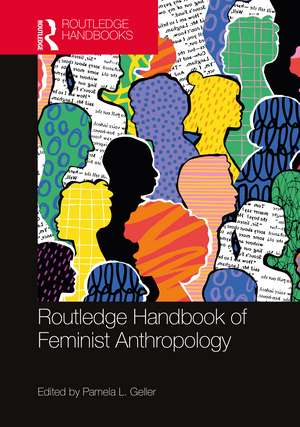The Routledge Handbook of Feminist Anthropology: Routledge Handbooks of Gender and Sexuality
Editat de Pamela L. Gelleren Limba Engleză Hardback – 23 dec 2024
Divided into three clear parts and comprising 34 chapters by an international team of contributors, the Handbook addresses topics in the following key areas:
- resisting violence
- communicating creatively
- labor
- migration and displacement
- health and disease
- reproduction
- intersectionality
- decolonial work.
The Routledge Handbook of Feminist Anthropology is essential reading for students, researchers, and instructors in anthropology, and will also be of interest to those in related disciplines such as gender studies, queer studies, economics, biomedicine, political science, sociology, geography, and science and technology studies.
Preț: 1567.41 lei
Preț vechi: 1911.47 lei
-18% Nou
Puncte Express: 2351
Preț estimativ în valută:
299.92€ • 326.81$ • 252.73£
299.92€ • 326.81$ • 252.73£
Carte tipărită la comandă
Livrare economică 23 aprilie-07 mai
Preluare comenzi: 021 569.72.76
Specificații
ISBN-13: 9781032298368
ISBN-10: 1032298367
Pagini: 568
Ilustrații: 80
Dimensiuni: 174 x 246 mm
Greutate: 1.1 kg
Ediția:1
Editura: Taylor & Francis
Colecția Routledge
Seria Routledge Handbooks of Gender and Sexuality
Locul publicării:Oxford, United Kingdom
ISBN-10: 1032298367
Pagini: 568
Ilustrații: 80
Dimensiuni: 174 x 246 mm
Greutate: 1.1 kg
Ediția:1
Editura: Taylor & Francis
Colecția Routledge
Seria Routledge Handbooks of Gender and Sexuality
Locul publicării:Oxford, United Kingdom
Public țintă
Postgraduate, Undergraduate Advanced, and Undergraduate CoreNotă biografică
Pamela L. Geller is Associate Professor of Anthropology at the University of Miami, USA. She is the author of The Bioarchaeology of Social-Sexual Lives: Queering Common Sense about Sex, Gender, and Sexuality (2017), Theorizing Bioarchaeology (2021), and Becoming Object: The Sociopolitics of the Samuel George Morton Cranial Collection (2024). Geller also writes for lay audiences; her essays have appeared in Slate, Miami Herald, and The New York Times.
Cuprins
PART I Consciousness-raising; On resisting violence; 1. Sexual violence as professional misconduct in the practice of anthropology M. Gabriela Torres; 2 Sexual harassment in archaeology: Taking stock and moving forward Amber M. VanDerwarker; 3 Neocolonialism and palaeoanthropology: Reflections from a white feminist in Southern Africa Rebecca R. Ackermann; 4 Whisper networks and woke networks Anna Babel and Ashlee Dauphinais Civitello; 5 Gender, violence, and memory Shahla Talebi; 6 Feminicide/femicide: A global crisis Brigittine M. French; On communicating creatively; 7 Feminism and digital archaeology Katherine Cook; 8 Ethnographic poetry as a decolonial feminist praxis Ather Zia; 9 Visualizing ethnography: Feminist praxis in anthropological film Ethnocine Collective; 10 Comics, graphic novels, and feminism Marie-Eve Carrier-Moisan; PART II Precarity; On labor; 11 Demystifying the sexual division of labor: A look from human evolution Danae G. Khorasani and Sang-Hee Lee; 12 Trauma and past lives Rebecca C. Redfern and Linda Fibiger; 13 The historical archaeology of sex work Kristen R. Fellows; 14 Unveiling the engima of culture: Reflections on gendered precarious work in China and Japan Huiyan Fu; 15 The gendered globalization of labor Carla Freeman and Hunter Akridge; On migration and displacement; 16 Global mobilities, intimate moments: Embodying nineteenth-century domestic labor Alanna L. Warner-Smith; 17 Blood, mud, and mucking around with waste: Properties of reworlding postindustrial space Shannon A. Novak; 18 Feminist takes and contributions to refugee and displacement studies Katarzyna Grabska; 19 Discourse and the gendered racialization of displacement Hilary Parsons Dick, Júlia Da Silva, Madeline Lynch, and Maria Terrinoni; On health and disease; 20 Increased female mortality after environmental disaster: Perspectives from primate studies Alison M. Behie; 21 Feminist anthropology and epidemics Shelley Lees; 22 “Studying up” health inequities Sandhya Ganapthy; 23 Reframing old bones and old stories: Gendered patterns of health and disease in the past Sabrina C. Agarwal; On reproduction; 24 Mothers and infants: Materializing maternal health and reproductive loss in the past Rebecca Gowland; 25 Reproductive oppression at the intersections: An archaeology of Hollywood Plantation Jodi A. Barnes; 26 Perspectives on intersectionality from public health and medical anthropology to promote health equity and reproductive justice Annie Preaux and Arachu Castro; 27 Racial disparities and racism in reproductive experiences Chiara Quagliariello,Veronica Miranda, and Mounia El Kotni; 28 Technology, health, and gender Cecilia McCallum, Ana Paula dos Reis, and Mariana Pitta Lima; PART III Praxis; On intersectionality; 29 Archaeology, intersectionally: Past lives and present-day sociopolitics Anna S. Agbe-Davies; 30 Ethnographing intersectional inequalities Carmen Gregorio Gil and Mara Viveros-Vigoya; 31 On disinheritance, intersectionality, and environment: Zora Neale Huston’s Florida Writers’ Project fieldnotes Sarah E. Vaughn; On decolonial work; 32 Mothering in the decolonial moment Ziyanda Majombozi; 33 Decolonizing masculinities Sakhumzi Mfecane; 34 Decolonizing methods in feminist ethnography: Reflections from Andean Peru and coastal Ecuador Florence E. Babb and Maja Jeranko
Descriere
The Routledge Handbook of Feminist Anthropology is a comprehensive inter- and intradisciplinary survey of feminist anthropology. Essential reading for students, researchers, and instructors in anthropology, it will also interest those in related disciplines such as gender studies, biomedicine, sociology, geography, and science.


